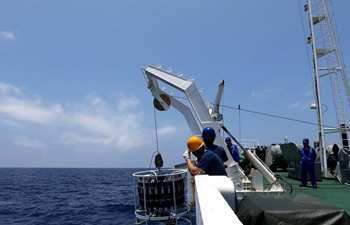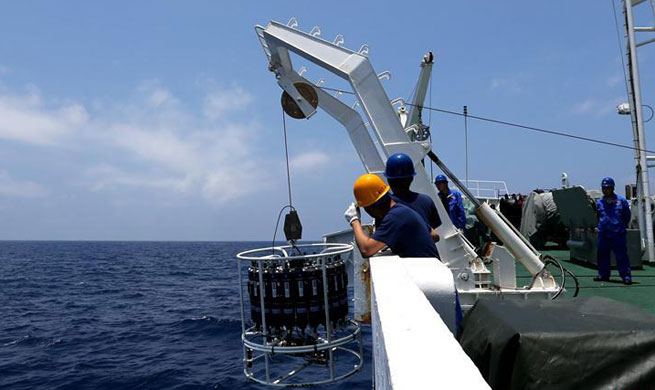By Victoria Arguello, Juan Manuel Nievas
CARACAS, April 25 (Xinhua) -- Recent floods and deadly mudslides, as well as withering droughts in Latin America have put the spotlight on extreme weather conditions that are likely to be more frequent due to climate change, according to experts.
Though the rise in global temperature has been gradual, its consequences are often swift and disastrous.
Earlier this year, the so-called "coastal El Nino" phenomenon, caused by unusually high sea temperatures, sparked torrential rains and floodings that claimed more than 100 lives in Peru, according to the National Emergency Operations Center.
The disaster also left more than 155,000 people homeless, destroyed nearly 6,000 kilometers of roadways, and swept away 258 bridges.
Reconstruction is estimated to cost 12 billion to 15 billion U.S. dollars, Peru's Minister of Defense Jorge Nieto said in early April.
Successive natural disasters caused by extreme weathers followed fast on the heels of Peru, hitting Colombia, Ecuador and Uruguay, before returning to lash Colombia again.
A landslide in Colombia's southern city of Mocoa killed more than 300 people on April 1. Less than three weeks later, mudslides destroyed some 75 homes and killed at least 14 residents in Manizales, a town in west-central Colombia.
"Dramatic changes (in the environment) have accelerated phenomena associated with climate change that are lashing the region," Carlos Dario Ramirez, a biologist at the Venezuelan Institute for Scientific Research, told Xinhua.
"Latin America has in recent years seen changes in the weather system that were previously controlled, but due to human intervention, phenomena such as El Nino and La Nina are increasingly affecting countries closest to the Pacific region," said Ramirez.
"Venezuela has experienced a problematic drought for nearly two years, from 2015 to 2016," he recalled, "which damaged crops and wildlife," and led the government to explore "what the vulnerabilities were in order to minimize the impact of climate change."
Venezuela also decided to pursue environment-friendly policies to move away from fossil fuels by promoting the use of solar and wind power.
While countries need to take individual steps to mitigate the effects of extreme weathers on their populations, the problem of climate change requires a global effort, the experts agreed.
Venezuelan climate analyst Cesar Eulogio Prieto said that "since we are already feeling the effects of climate change, the issue has become a priority on the agenda of nearly every country in the world, as shown by the 2015 Paris agreement."
Reached at the United Nations climate change conference held in the French capital in 2015, the Paris agreement aims to prevent global warming, setting a temperature hike limit target.
"The topic is so important and urgent that in discussions on how to tackle it, the debate is not just about how to reduce its causes, but also how to prepare for its consequences," said Prieto.
Cindy Fernandez, of Argentina's national meteorological service, believed that global warming is altering weather patterns.
"Climate change is affecting the whole world in different ways, and Argentina is no exception," she noted.
"In recent years, we have seen an increase in extreme rain incidents, so we can expect it to become increasingly more frequent," Fernandez said.
Precipitation in Argentina has risen, "not because there are more rainy days, but because it rains more each time. When it rains, we get more water than before," she explained.
In the past few weeks, severe downpours have been reported in seven provinces, leading to the evacuation of hundreds of people and material damage.

















